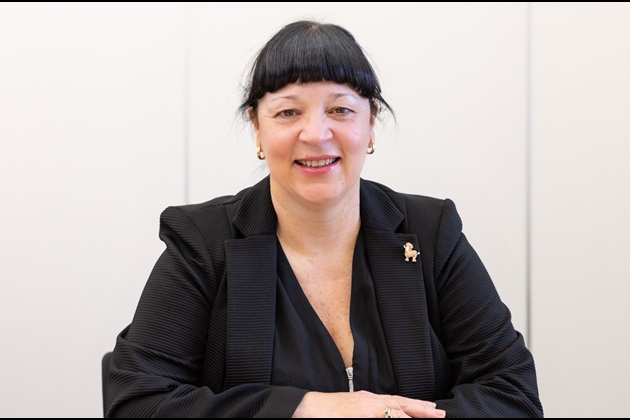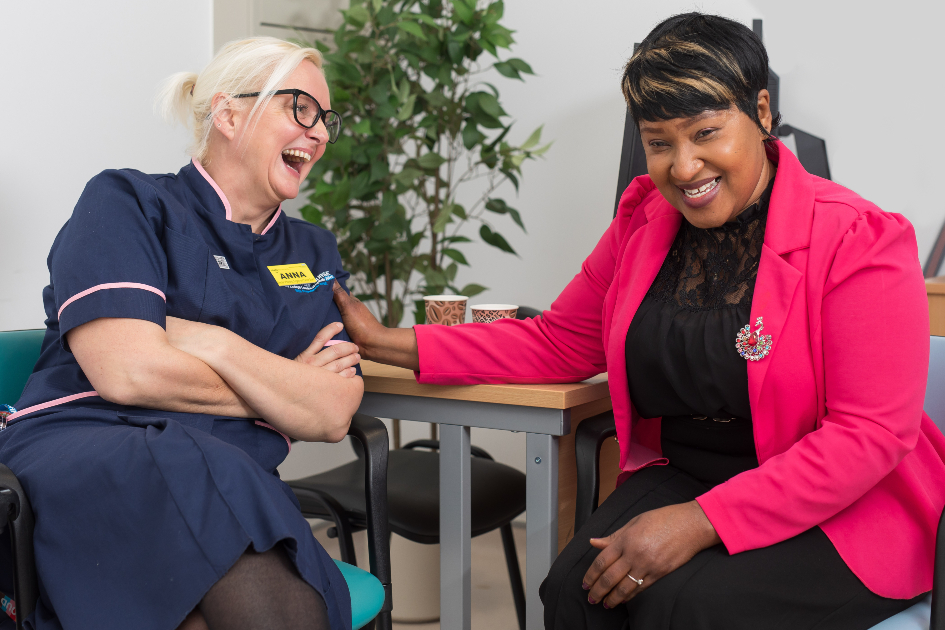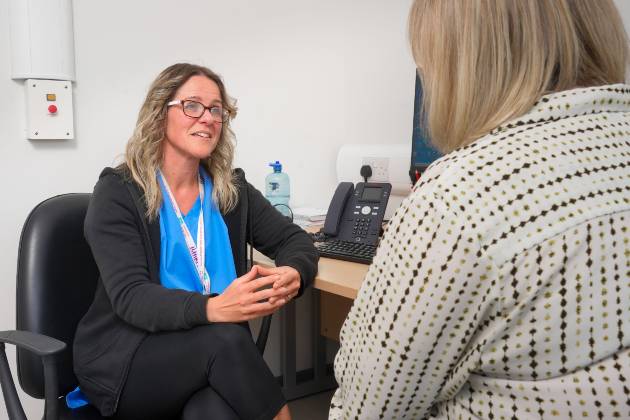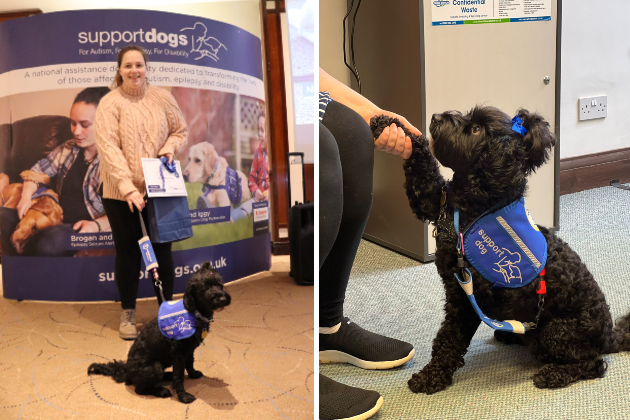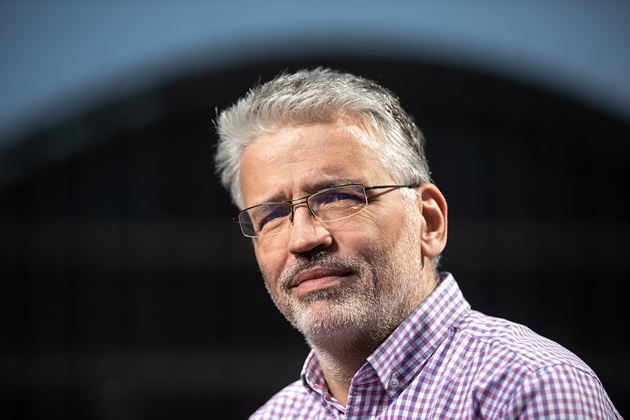Tracey Budding began her two-year term of office as RCN deputy president in January. Recently, she caught up with RCN President Professor Dame Anne Marie Rafferty to discuss her nursing career and what she hopes to achieve in her new role as deputy president.
You can watch the full conversation on our YouTube channel. Keep scrolling to watch some highlights and to read our Q&A with Tracey.
Can you tell members a little bit about your nursing career?
I started my nursing career as a voluntary worker at a local psychiatric unit, where both my parents worked. I’d always wanted to be a nurse and have fond memories of rushing home from school and putting on a health care assistant’s uniform to help the nursing staff care for the patients.
My first nursing job was as a health care assistant looking after older people; a job I adored. But my vision had always been to become a registered nurse and work in the field of neonatal intensive care, and I eventually started my registered nurse training in 1991.
I worked in a paediatric ward before moving to a neonatal intensive care unit (NICU). I wanted to widen my knowledge and skills in nursing so decided to undertake further training in paediatrics to become dual-qualified as a registered general nurse (RGN) and registered sick children’s nurse (RSCN). After completing my training, I spent some time working in a high dependency unit looking after adults and children following orthopaedic oncology surgery.
I also remained on the trust’s bank for NICU and eventually returned to the unit full time, staying there for almost 30 years, working in roles from staff nurse to modern matron. I took early retirement from my neonatal clinical role in August 2020. I’m now working part time in a specialist nurse role in the gynaecology outpatient’s department.
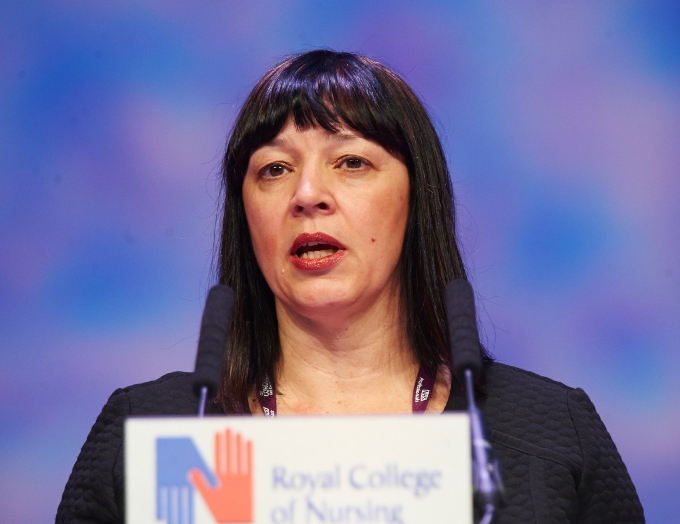
How did you get involved in the RCN?
I first got involved in the RCN when I needed some support from my local rep following an issue with my manager. The rep was impressed with how I’d dealt with the situation and encouraged me to become more involved with the RCN. Both my mum and uncle held senior positions within trade unions many years ago, so you could say it’s in my blood to follow the trade union path.
I went to my first RCN Congress in 2002 and I was in awe of all the like-minded members and staff I came across – I hadn’t even realised there was that world out there. I admired their courage in getting up and speaking passionately about the things that mattered to them, including everything to do with nurses and nursing.
I went to my first Congress in 2002 and I was in awe of all the like-minded members I came across
The following year, I presented a resolution at Congress which called to further widen RCN membership to allow nursery nurses to join. This was something I was very passionate about having worked alongside some amazing, experienced and loyal nursery nurses within my role in neonatal care. This led to me becoming more involved with the RCN by helping to shape these membership changes within the College.
I also became a steward, safety rep, and learning rep, and I’ve represented these roles on a local, regional and national level. This work led me to get involved in many organisational changes for both the College and my local trust.
I’ve held a variety of elected roles during my time in the RCN including branch chair, branch secretary, regional board chair and various committee vice chair roles. I’ve sat on the RCN’s UK stewards and safety reps committees and I’ve served two full terms of office on RCN Council. Most recently, I was vice chair of the RCN Trade Union Committee which deals with pay, and terms and conditions on a national level.
What are you most proud of?
I’ve had such a rich clinical career and trade union career running in tandem so it’s hard to pinpoint one particular thing.
Presenting a resolution at Congress was a proud moment – it was also a scary moment because I’d never done anything like that before. My involvement in making the resolution a reality is one of the highlights of my RCN journey.
I felt so proud when I finished my first term of office on RCN Council – during this time changes had been made to allow all nursing support workers to become members and to hold elected seats within the governance structures of the RCN. This started with my Congress resolution and I believe it has been instrumental in making all members feel valued and recognised as an integral part of the RCN membership.
In my nursing career, I’m very proud that I’ve been able to develop my nursing, management and leadership skills to become the nurse and trade union rep I am today. My involvement with the RCN has given me many opportunities and enhanced my skills. I’m most proud that throughout my career I’ve been able to speak up for nursing staff and that’s something I will continue to do in the role of RCN deputy president.
I’m proud that I’ve been able to speak up for nursing staff and that’s something I will continue to do in this role
What are your ambitions in the role of RCN deputy president?
It’s a very challenging time and I do prefer face-to-face contact when speaking with members. I had a vision when I put myself forward for this role that I would try to reach out to all members and talk to them face to face, no matter where they worked or what specialty they were in.
This role is completely different to my other roles. I see it as encapsulating the whole membership and even though in the current circumstances it’s more challenging, I do want to engage with as many members as possible and understand what they want me to focus on in this role, and what’s important to them. I’ll be looking at how I can best achieve that in the coming weeks.
We do some amazing things in the RCN to support and protect members, but I think we could share a bit more. I see part of my role as signposting members to that information and giving them encouragement and support to achieve their goals.
Sometimes all it takes is for someone to listen, especially in a pandemic. We’re all dealing with the added pressures at the same time, and it’s important for us to listen to members and signpost them to the most appropriate support. We need to encourage members to speak out to their local reps, their regional and country offices and to raise their concerns so we can pick them up both locally and nationally on their behalf.
What do you hope to see for the nursing profession following the pandemic?
We entered the pandemic with a shortage of 50,000 nurses across the UK and on top of that, we’re now faced with the added strain of winter pressures. We need to continue to press the government to put measures in place to ensure appropriate nurse staffing levels, alongside clear accountability and appropriate workforce plans.
I’ve worked in a specialty where having the right staffing levels and appropriate skill mix is so crucial and I’ve seen first-hand the issues short staffing can cause for both patients and staff.
I think the pandemic has highlighted the skills and expertise nurses bring to every aspect of the care we deliver
I think the pandemic has highlighted the importance of safe nurse staffing levels and the skills and expertise nurses bring to every aspect of the care we deliver. It’s not just about facts and figures; it’s about our future workforce and the future health and safety of the nation.
We need to work together more collectively with our members, partnership organisations and key decision-makers. We all need to be honest when we get it wrong, instead of pushing the blame elsewhere. The RCN is here to support members and I hope I can encourage all members, no matter what their speciality is, no matter where they work, to raise their concerns so we can better support them. I will continue to work tirelessly in supporting the organisation to be the voice of nursing across the UK.
Get involved
You can get more involved in the RCN by putting yourself forward as a candidate for RCN Council or a committee, board or forum. Find out more.


